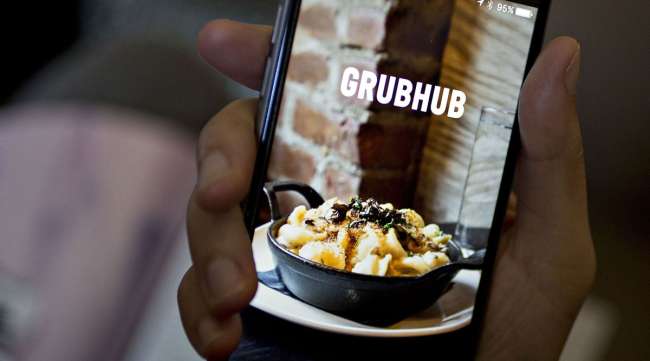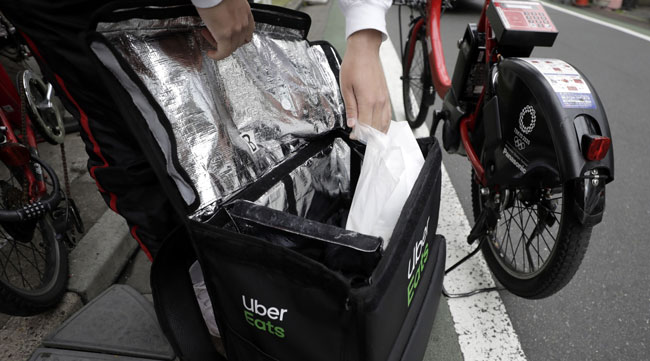Uber’s Bid to Acquire Grubhub Draws Rebukes

[Ensure you have all the info you need in these unprecedented times. Subscribe now.]
Uber Technologies Inc.’s offer to buy Grubhub Inc. antagonized officials in Washington and major U.S. cities, who already were taking steps to limit the fees companies charge restaurants and regulate their treatment of workers. If a deal between the companies proceeds, analysts said it is likely to face antitrust scrutiny.
David Cicilline, a U.S. representative from Rhode Island who heads the House antitrust subcommittee, said the proposed deal underscores the urgency for a moratorium on most mergers, an idea supported by other Democrats.
“Uber is a notoriously predatory company that has long denied its drivers a living wage. Its attempt to acquire Grubhub — which has a history of exploiting local restaurants through deceptive tactics and extortionate fees — marks a new low in pandemic profiteering,” Cicilline said in a statement.
In San Francisco and Seattle, officials recently set limits on delivery fees, and Boston, Chicago and Los Angeles are among cities that have mulled similar measures. New York is set to vote May 13 on restrictions that would bar companies from charging restaurants delivery fees of more than 15% and impose other limits. Such regulations are meant to protect restaurants and customers who are driving a surge in delivery orders while at home during the coronavirus pandemic.

An Uber Eats delivery courier places a take-out order into a delivery backpack in Tokyo, Japan, on April 21. (Kiyoshi Ota/Bloomberg News)
“Many small businesses and customers rely on these services, and we’ve seen that the fees, either on restaurants or on customers, can spike to unacceptable levels and without competition there’s less to limit their ability to price gouge,” said Matt Haney, who sits on the San Francisco Board of Supervisors and has criticized Uber for its delivery fees.
Uber said it is focused on driver safety and helping support independent, local restaurants struggling from effects of the virus.
“Regulating the commissions that fund our marketplace — particularly during these unprecedented times — would force us to radically alter the way we do business, set a far-reaching precedent in a highly competitive market and could ultimately hurt those that we’re trying to help the most: customers, small businesses and delivery people,” the company said in a statement.
Food delivery tie-ups are complicated. Even before the COVID-19 crisis, many of the operations were unprofitable as they fought for market share. In New York alone, at least a dozen food delivery services compete for customers who increasingly are ordering from multiple platforms. Grubhub, the oldest of the major apps, had been forced to burn cash to play defense against upstarts such as DoorDash Inc., the U.S. market leader, and Uber. Investors saw the prospect for consolidation as a way to help limit losses, but inflated private valuations and the risk of antitrust review presented hurdles to deal-making.
Then COVID-19 hit. Uber has had to reassure investors that it has enough cash to survive the year and pushed its goal of making an adjusted profit out to 2021. It also told 3,700 employees that they were losing their jobs, information many of them reportedly received over a Zoom call. Grubhub withdrew its financial guidance last month.
Profits are elusive in the food delivery business. Uber’s adjusted revenue for food delivery more than doubled in the first three months of the year, according to the company’s latest financial report. But even with that massive increase in sales, the loss from food delivery actually increased by 1% in the period to $313 million. And that’s before the full brunt of the pandemic took hold in the U.S.
Meanwhile, these companies face calls from officials to improve conditions for their gig economy workers. California’s attorney general sued Uber and rival Lyft Inc. last week, alleging they’re in violation of a state law designed to give their workers the benefits of employees. A loss in that case could set an important precedent that increases costs for these companies and raises further questions about their ability to be profitable.
Persistent losses in the industry are why mergers seemed likely to many analysts and investors. In March, DoorDash accounted for 42% of the U.S. meal delivery market, according to research firm Second Measure. Grubhub had 28% and Uber 20%. “We’ve long believed that consolidation in online food delivery is inevitable,” D.A. Davidson analyst Tom White wrote in a note to clients May 12.
But the current economic conditions increase the likelihood of drawing the attention of antitrust regulators, White wrote, especially “given the impact any deal could have on a restaurant industry that is struggling to survive in the face of the pandemic.”
Restaurant advocates also said they were worried about the potential consequences of a deal.
“It’s extremely concerning,” said Andrew Rigie, executive director of the NYC Hospitality Alliance, a group that represents restaurants in New York. Grubhub and its Seamless division already dominate the city, Rigie said, “and they use their leverage and market share at the expense of local restaurants.”
Bradley Tusk, an early Uber adviser who has since sold his stake in the company, said if the policies cities are considering take hold long term, “it may be that consolidation is the only way to have a couple of market players that can survive at all.”
Otherwise, food delivery could end up looking like the costly ride-hailing rivalry between Uber and Lyft.
“Uber should have found a way to buy or kill Lyft a lot earlier,” Tusk said.
Want more news? Listen to today's daily briefing:




